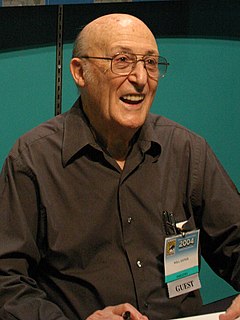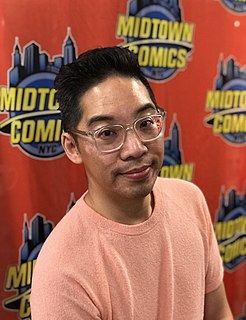A Quote by Jessica Abel
I don't think comics use iconic forms - or they don't have to. But that makes them even more "cool," if I understand the idea. One has to be quite involved to make comics work. Signals have to be decoded on both the verbal and visual level, simultaneously, and the reader must do a lot of cognitive work between panels as well. Comics definitely need an engaged reader.
Related Quotes
There are a lot of good comics, no doubt, but as far as the quality of the comics goes, I think what you have is a bunch of situational comics - there are black comics that work only black crowds, gay comics that do only gay crowds, and southern comics that only work down South, and so on with Asian, Latino, Indian, midgets, etc. The previous generation's comics were better because they had to make everybody laugh.
Still,[...] in all forms of comics the sequential artist relies upon the tacit cooperation of the reader. This cooperation is based upon the convention of reading and the common cognitive disciplines. Indeed, it is this very voluntary cooperation, so unique to comics, that underlies the contract between artist and audience.
Surely comics require more effort on the part of the reader than movies or television. I'm always learning new things you can do with comics that wouldn't work in any other medium, and often they require the need to process a lot of dense information. Of course, the trick is to make the complicated seem effortless and spontaneous.
When I was a kid, back in the '40s, I was a voracious comic book reader. And at that time, there was a lot of patriotism in the comics. They were called things like 'All-American Comics' or 'Star-Spangled Comics' or things like that. I decided to do a logo that was a parody of those comics, with 'American' as the first word.
The magic of comics is that there are three people involved in any comic: There is whoever is writing it, and whoever is drawing it, and then there's whoever is reading it, because the really important things in comics are occurring in the panel gutters, they're occurring between panels as the person reading the comics is moving you through, is creating a film in their heads.
In early comics, you see the amazing awkwardness and bizarre reasoning in the storyline, and it's because comics hadn't really been invented yet. There was no format for them to follow. They were just making it up. So I try to incorporate that kind of awkwardness in my comics quite frequently, which is odd. In some ways, I can't be as awkward as I'd like. But I do think that's one way in which my comics are unusual, because I will try to make the artwork look bad, occasionally.
A comic will always be more 'personal' than a DVD or CD, both of which require electronic 'players' to decode their content. With comics, the reader is the player so the engagement with the material is always more fundamental and dynamic. Reading comics is a much less passive activity than consuming CDs and DVDs.




































